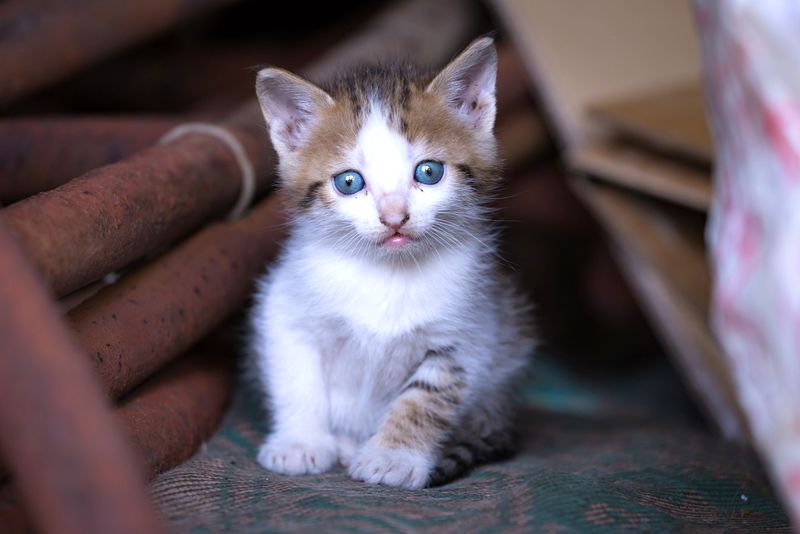Is your cat sad?

The main signs that indicate that your cat is in a bad mood
The cat has its own personality. Cats have different social behaviors just like people. Some are easier to socialize, some are more difficult. But if your social cat suddenly becomes unusually withdrawn and quiet, then you have reason to be worried.
In most cases, cat owners cannot understand why their cat feels depressed and why it is sad. But if you pay attention to some of the signs, you can be reassured because some phenomena may only be temporary. Learn about what may be causing your cat's depression and understand the best course of action
Signs of depression
Your cat's appearance can tell you how she is feeling. Pay attention to some of the signs.
- Changes in your cat's vocalizations: Your cat may start meowing less or more than usual. This is a fairly obvious sign that can tell you that something is going wrong. A low tone and moaning sounds may suggest that your cat is unhappy. Purring doesn't always mean happiness. sometimes an unhappy kitty may purr just to make herself feel better. Voiced cats can become quiet and quiet cats can become much louder.
- Body: Sometimes body language can show you all the information you need. The position of the body, the hair of the ears and the eyes can indicate some change in your cat's behavior. If your cat's tail is tucked up, his ears are flattened, and his hair is standing on end, that's a sure signal that your cat is feeling sad.
- Fear or aggression: Sad cats show their fear and aggression more quickly. If you notice that your cat has become overly aggressive or fearful, it is most likely depressed.
- Hiding, change in personality and compulsiveness: A sad cat can quickly lose interest in what it used to love. It may become antisocial and hide. Calm cats can become overly demanding and obtrusive. If your cat is sad, his fear of strangers can increase dramatically.
- Too much sleep: Cats like to sleep a lot, but if the cat feels sad the amount of sleep will only increase. If she has changed her usual place to sleep, that is also a sign of sadness.
Bad grooming: If a cat feels sad, he will stop paying attention to his hygiene and his coat will look ungroomed.
- Changes in appetite, refusal to eat: If you notice that your cat's appetite has changed, he may be sad. If your cat is refusing her favorite treats, something is probably wrong.
- Change in her toilet habits: A sad cat may start urinating in all sorts of places to get her scent. This makes her feel better about herself. In fact, a cat can start peeing in a variety of places for a variety of reasons, but sadness and depression are at the top of that list.
- Too much scratching: If your cat is feeling sad, she may start scratching objects and ruining furniture more than usual to mark her territory and relieve stress.
Causes of your cat's depression
There can actually be several reasons at once. Cats quickly become attached to certain family members (whether human or not). And if the dynamic of the relationship changes or is lost altogether, it can have a very serious impact on their emotional state. Regardless of what the cause of your cat's sadness is, try to give her more attention and your time so that she begins to feel happy. Sometimes the cause of sadness can be pain - and then you definitely need to take her to the vet.
Sickness
Illness may cause your cat to be in pain or not feeling well. The cat may stop playing with you if the pain prevents it from moving around normally. The cat may vomit if his hormones are out of balance, or if he has no energy because of the disease. Fatty liver disease, diabetes, hypothyroidism, dental disease are all very serious reasons for your cat to feel sad. If you suspect your cat is sick, you should not delay a trip to the vet and deal with the problem as soon as possible.
Injury
Sometimes some kind of injury prevents your cat from doing the things she used to love to do. After an injury, pain prevents your cat from feeling happy. Make sure you follow your veterinarian's advice and make an appointment for a follow-up exam. Even some very old injuries and surgeries can cause serious discomfort and pain, and then your cat needs pain management.
Loss
Losing a family member is a terrible event for everyone, even your cat. If your family member (animal or human) has moved away or passed away, your cat may begin to feel sad or even go into derpessia. This is usually temporary, and your cat's mood will go away after a while. If your cat misses someone too much, perhaps a new friend (such as another cat) can help. Be careful not to rush into this decision. As a rule, time is the best medicine in a situation like this. Sometimes various supplements and vitamins can help to make the cat feel better.
